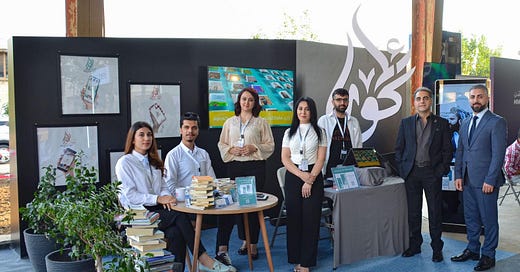Preserving Kurdish Stories of Survival in the Shadows of Genocide
Agora Vision is creating a digital library to share Kurdish stories with the world
“Have you heard of the attack on Halabja? Not everybody has.” To other Kurds, this question would sound ridiculous, but Nma Shawkat has family abroad and knows that in the wider world, there’s a surprising lack of knowledge when it comes to Kurdish affairs. Even events as definitive and traumatizing as the 1988 Halabja massacre, when Saddam Hussein launched the largest chemical weapons attack against a civilian population in history, killing up to 5,000 Kurdish people in the Iraqi city, can elicit a blank stare. “Many people around the world hardly know that Kurds exist, let alone the problems we have faced,” Shawkat, 25, says.
The attack occurred alongside the Anfal Campaign in the 1980s, when Saddam Hussein presided over a genocide that killed as many as 100,000 Kurds. It marked the most devastating assault in a century of persecution against Kurdish communities, who have suffered countless attacks as a minority population surrounded by hostility on all sides. More recent atrocities, in particular ISIS’ murderous campaign against the Kurdish-speaking Yazidi minority, have drawn attention. Still, it’s a lack of understanding surrounding the wider Kurdish community that Shawkat wants to address. “When people know who you are and what you have faced, these things are less likely to happen again,” she says.
Through her work as a business developer, she is making Kurdish stories available to online audiences via the digital broadcasting company, Agora Vision. The startup, which launched in 2022, aims to raise the voice of Kurdish authors across multiple genres by making their work accessible in e-book and audiobook formats online. “We want people to know about Kurdish history and care about our story,” she says. “Other countries don’t have to defend their culture, but when you are a minority, it needs to be showcased.”
There are several strands to the platform, including Agora Pertuk, which publishes Kurdish e-books, and their latest enterprise, Agora Deng, which recently secured an Innovation Hub grant to support the publication of Kurdish audio books online. Multiple Kurdish dialects are represented, including Sorani, Kurmanji, and others, to reach the widest audience possible. “Agora Vision faces many technical and financial challenges that are unique to being located in Iraqi Kurdistan, such as operating with undeveloped financial systems, low digital literacy, and, most significantly, the lack of funding for startups. This is why financial support, such as the grant provided by Ideas Beyond Borders, are a significant boost for startups like Agora Vision,” Shawkat says.
Many Kurds live abroad, in Europe, the US, and elsewhere, where access to reading materials in their native language is limited or non-existent. Living away from your community is already hard, Shawkat says, but more so when you can’t access material that connects with your homeland. “A lot of Kurds abroad want to read the works of Kurdish authors in Kurdish, so we’re trying to fill the gap in the market and bring this material to them,” she adds.
A third strand of the program, Agora Voice, publishes Kurdish works translated into English. There are only two novels here so far, but both offer powerful insights into the Kurdish experience for readers outside the community. Son of Mountains by Yassin Aref describes the author’s experience of starting a new life abroad after fleeing Saddam Hussein’s regime in the 1990s. Several years after settling in Albany, New York, he is accused of supporting terrorism and sentenced to 15 years in prison. His memoir chronicles the pain of this experience and the impact on his family as their hopes of safety and freedom are snatched away.
The Tears of Snow by Abdulkadir Saeed is about the attack on Halabja and life afterward for those who survived. Through the eyes of the author—who was a child at the time—the reader bears witness to one of the worst atrocities in Kurdish history, traveling with him as he flees his devastated city to begin his life again. The enduring impact of this event in the collective memory of Kurdish communities is conveyed when the author returns to Halabja and finds himself disconnected and alone, all traces of his relatives gone. It is a powerful portrayal of the meaning of family and the importance of connection in a community that has been dispersed time and again.
Compiling works by different Kurdish authors across diverse genres and dialects brings unity to the Kurdish experience, collating stories and memories from across the diaspora. It’s also a way of preserving these accounts for future generations. “We all know that hard copies of books can be in danger - making a Kurdish library available in digital format is another way of protecting it,” Shawkat says.
It’s also an effective way of countering the forces of censorship and resisting attempts to stifle Kurdish expression. Using digital platforms helps bypass social and political boundaries, providing access to works that are difficult to source elsewhere. “Across the Middle East, we see Kurds subjected to human rights violations every day as governments oppress and marginalize Kurdish communities, whether by banning them from speaking their own language, forcing them out of their homes or denying them political and economic opportunities,” says Faisal Al Mutar, President of Ideas Beyond Borders. “This is one way of raising the collective Kurdish voice and ensuring that people all over the world have a way of hearing it.”
This article was written by Olivia Cuthbert.




